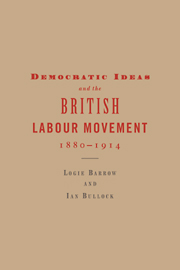Book contents
- Frontmatter
- Contents
- Acknowledgements
- Introduction
- Part 1
- Part 2
- Part 3
- 7 The early 1900s: a hinge period
- 8 Socialists and the state
- 9 Parliamentary socialism? Labour in parliament
- 10 Parliamentary democracy? ‘Fred's obsession’ and the path to the Bradford resolution
- 11 Background to syndicalism: the legacy of the NIGFLTU's failure
- 12 Avoiding the ‘Servile State’. The impact of Syndicalism and Guild Socialism
- 13 1914: an emerging consensus on the eve of Armageddon
- Conclusions
- Appendix: Federation for local Labour historians – and for national
- Index
7 - The early 1900s: a hinge period
Published online by Cambridge University Press: 09 November 2009
- Frontmatter
- Contents
- Acknowledgements
- Introduction
- Part 1
- Part 2
- Part 3
- 7 The early 1900s: a hinge period
- 8 Socialists and the state
- 9 Parliamentary socialism? Labour in parliament
- 10 Parliamentary democracy? ‘Fred's obsession’ and the path to the Bradford resolution
- 11 Background to syndicalism: the legacy of the NIGFLTU's failure
- 12 Avoiding the ‘Servile State’. The impact of Syndicalism and Guild Socialism
- 13 1914: an emerging consensus on the eve of Armageddon
- Conclusions
- Appendix: Federation for local Labour historians – and for national
- Index
Summary
There is always more than one way of telling a story. Let us summarise a simple one. In the first twenty years of the modern socialist movement in Britain two distinct tendencies gradually solidified. One was idealistic or even Utopian, and committed to strong radical notions of democracy to be pursued unwaveringly first within the movement and then, using that movement, to transform the state utterly. The second was more realistic and accepted the democratic possibilities of the ‘British constitution’ with only a few reservations.
The failures of the 1890s, above all the ultimate fiasco of NIGFTLU, effectively saw off the first tendency for all but the incurably romantic and permanently immature. The second tendency, guided by the statesmanship of Keir Hardie and Ramsay MacDonald, became flesh as the Labour Representation Committee (or Labour Party as it was already unofficially called).
The story can certainly be told in that way. But it is mistaken in regarding the British socialist movement at the beginning of this century solely in terms of the evolution of the Labour Party. The bodies of opinion represented by Justice and the Clarion, which were highly critical of and sometimes hostile to the emerging party, remained active in every debate and conflict.
Only the ILP – and then only what its critics called its ‘official section’ – was fully committed to Labour. The SDF withdrew from the Labour Representation Committee in 1901, while the leading Fabians busied themselves with, arguably, their most successful piece of ‘permeation’ in promoting the Conservatives’ 1902 Education Act.
- Type
- Chapter
- Information
- Democratic Ideas and the British Labour Movement, 1880–1914 , pp. 139 - 161Publisher: Cambridge University PressPrint publication year: 1996

